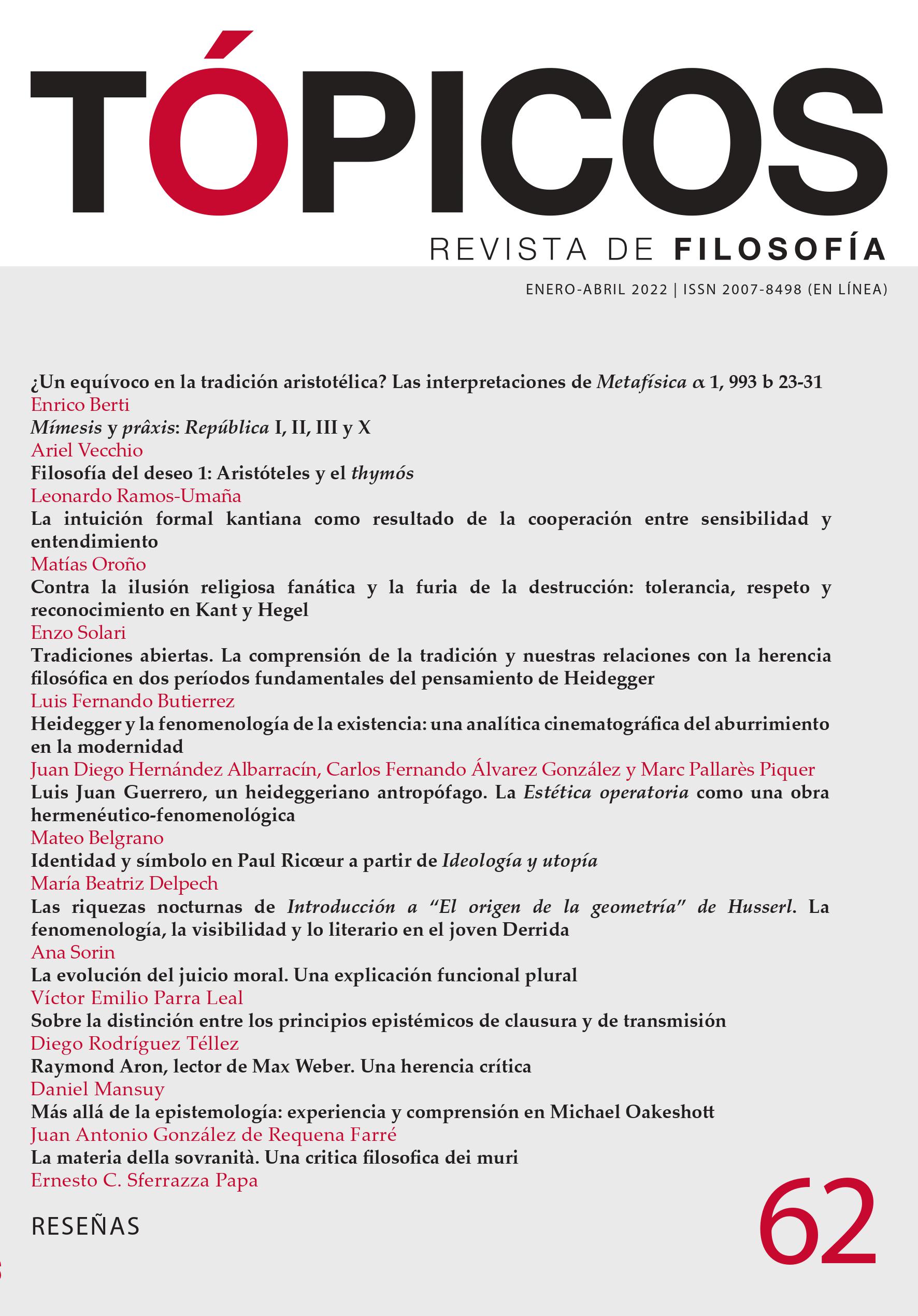Publicado 2021-12-11
Derechos de autor 2021 Tópicos, Revista de Filosofía

Esta obra está bajo una licencia internacional Creative Commons Atribución-NoComercial-SinDerivadas 4.0.
Cómo citar
Resumen
El presente artículo aprovecha la reflexión crítica de Jeffrey Barash sobre la cuestión del símbolo en la obra de Ricœur. El exégeta, interesado en el locus de la memoria colectiva que encuentra en La memoria, la historia y el olvido, considera la necesidad de abandonar el concepto de “analogía” de Husserl que Ricœur sostiene. Con ese fin, llama la atención sobre la concepción del símbolo que Ricœur evita desarrollar en el contexto de la discusión de la memoria. En consecuencia, realiza una pesquisa acerca de los antecedentes de la cuestión en Freud: una interpretación de la cultura (1965) y en Tiempo y narración (1983-1985). En el presente artículo intentaré mostrar que el curso impartido en Chicago en 1975, Ideología y utopía, es la obra indicada para responder desde el simbolismo a los problemas de la constitución de la memoria colectiva a través del aporte que realiza Ricœur en su trabajo sobre la ideología.
Referencias
- Barash, J. (2006). Qu’est-ce que la mémoire collective ? Réflexions sur l’interprétation de la mémoire chez Paul Ricœur. Revue de métaphysique et de morale, 2(50), 185-195.
- Barash, J. (2007). Analyzing Collective Memory. En D. Mendels (ed.), On Memory. An Interdisciplinary Approach. (pp. 101-116). Peter Lang.
- Barash, J. (2008). Les enchevêtrements de la mémoire. En G. Fiasse (ed.), Paul Ricœur. De l’homme faillible à l’homme capable. (pp. 19-36). Presses Universitaires de France.
- Barash, J. (2010). The Place of Remembrance. Reflection on Paul Ricœur’s Theory of Collective Memory. En B. Treanor y H. I. Venema (eds.), A Passion for the Possible: Thinking with Paul Ricœur. (pp. 147-157). Fordham University Press.
- Barash, J. (2016). Collective Memory and the Historical Past. University of Chicago Press.
- Bertucci, A. (2006). Entre el romanticismo y el estructuralismo: la concepción del símbolo en Paul Ricœur. [Ponencia]. VII Coloquio Internacional de Filosofía. Mesa redonda. Homenaje a Paul Ricœur (1913-2005). San Carlos de Bariloche.
- Busacchi, V. (2016). Habermas and Ricœur’s Depth Hermeneutics. From Psychoanalysis to a Critical Human Science. Springer.
- Delpech, M. B. (2017). Justicia, capacidad y reconocimiento en la antropología de Paul Ricœur. En A. Cuevas Peña y S. P. López González (eds.), Justicia. (pp. 47-74). Universidad de Guadalajara.
- Gabriel, S. (2015). Ricœur y lo político. Prometeo.
- Marcelo, G. (2018). Critique des idéologies, critique des utopies. Études Ricœuriennes / Ricœur Studies, 9(1), 28-41. DOI: https://doi.org/10.5195/errs.2018.430.
- Ricœur, P. (1996). Sí mismo como otro. A. Neira Calvo (trad.). Siglo XXI.
- Ricœur, P. (2004a). Finitud y culpabilidad. C. de Peretti, J. Díaz Galán y C. Meloni (trads.). Trotta.
- Ricœur, P. (2004b). Parcours de la reconnaissance. Folio.
- Ricœur, P. (2006). Ideología y utopía. A. L. Bixio (trad.). Gedisa.
- Ricœur, P. (2010a). La memoria, la historia y el olvido. A. Neira Calvo (trad.). Fondo de Cultura Económica.
- Ricœur, P. (2010b). Del texto a la acción. P. Corona (trad.). Fondo de Cultura Económica.
- Taylor, G. (2006). Introducción del compilador. En P. Ricœur, Ideología y utopía. (pp. 11-42). A. L. Bixio (trad.). Gedisa.
- Todorov, T. (2008). Los abusos de la memoria. M Salazar Barroso (trad.). Paidós Ibérica.





